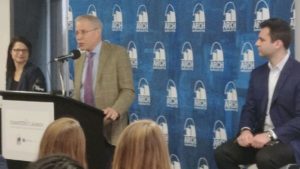Few things are more visibly disruptive to the process of democracy than the long lines of frustrated voters.
In a contentious Presidential election year such as this one, mounting grievances have already been realized in the recent primary elections. Headlines about voting irregularity reports were the digital afterglow as primaries moved from state to state.

While some have been outraged at the lack of efficiency, Scott Leiendecker has seen this kind of thing over and over. For six years, Leiendecker served as the elections director for the City of St. Louis.
He had a front-row seat to frustrations about what seemed to him a highly antiquated process.
“Long lines are a big deterrent for potential voters. People typically arrive, see the long line and then find something else to do,” says Leiendecker. “I knew there was room for new technology that could help the process and increase the ease of voting.”
After years of listening to the lamentations of voters, Leiendecker left the public service life to found KNOWiNK, a St. Louis-based technology startup which provides polling devices for managing elections – a 2013 Arch Grants recipient.
With KNOWiNK poll pads, voters scan their ID or voter registration card and complete their voting on a tablet. The results and records are automatically digitally rendered.
“For voting districts, there is a fiscal reason to switch to a digital platform. With paper rosters, hundreds of thousands of records need to transferred and input into the system. This can take up to three months, and election boards have to pay temp workers. With our poll pad, the information is instantly transferred and the record is kept,” says Leiendecker.
According to Leiendecker, the timing for his technology could not be better since he predicts a record number for voting turnout in the Presidential elections in November. “This year, the long lines were at the primaries,” he says. “What is going to happen if we get a 70 percent turnout for the general election?”
Over the past four years, KNOWiNK poll pads have grown from just a few counties in Missouri to over 300 jurisdictions in 16 states. A recent breakthrough came with a rollout in Washington DC. Primary voters could both register and vote on the same day via the poll pad. Leiendecker claims that the help he received with Arch Grants was instrumental to the company’s growth for the past three year.
“I still reach out to the team at Arch Grants when I need help in knowing which direction to go with opportunities,” says Leiendecker.
Tweets Used to Accurately Predict Election Outcome
KNOWiNK is not the only Arch Grants company with ties to the election process. During a Costa Rican presidential election in 2014, simMachines, a predictive analytics company and 2012 Arch Grants recipient, decided to make a prognostication of the election outcome.
At the time, there was no clear front-runner in the fourteen-candidate field. The traditional forms of prediction tools like exit polls and surveys were not indicating a statistical victory. Costa Rican-native Arnoldo Muller-Molina, CTO of simMachines, decided to analyze data sets that were not normally looked at for predictions: social media.
“We took a look at the tweets, analyzed their content and also the sentiment of them,” says Muller-Molina, “We trusted our technology, and it turns out our technology was right.”
In the end, Muller-Molina’s prediction, based upon the technology said the victory would belong to The Citizens Action Party led by Luis Guillermo Solis, which had been running in fourth place at the time of the analysis. When the votes were tallied, however, Solis was indeed the narrow election winner.
While Muller-Molina is reticent to apply these same analytics to this year’s current US Presidential election (he does not even want to speculate), he has found a great many uses in the corporate world for accurate predictive data analysis that is backed up with reason. His clients include anyone from private firms to larger corporate entities who want to make the most of a robust set of data.
Earlier this year, simMachines was selected to be a part of Microsoft’s accelerator program in Seattle for startups focused on machine learning and data science.
The accelerator includes four months of access to Microsoft experts, a $25,000 grant and the opportunity to pitch on a Demo Day to investors, Of the over 700 companies reviewed for the program, simMachines was one of only ten. Muller-Molina credits their ability to stand out to the company’s experiences with Arch Grants.
“Arch Grants has been instrumental in the development of our company. They helped me relocate my business to the United States and have given me support and connections over the years. To this day, I use their advice to continue to polish my pitch,” says Muller-Molina.


